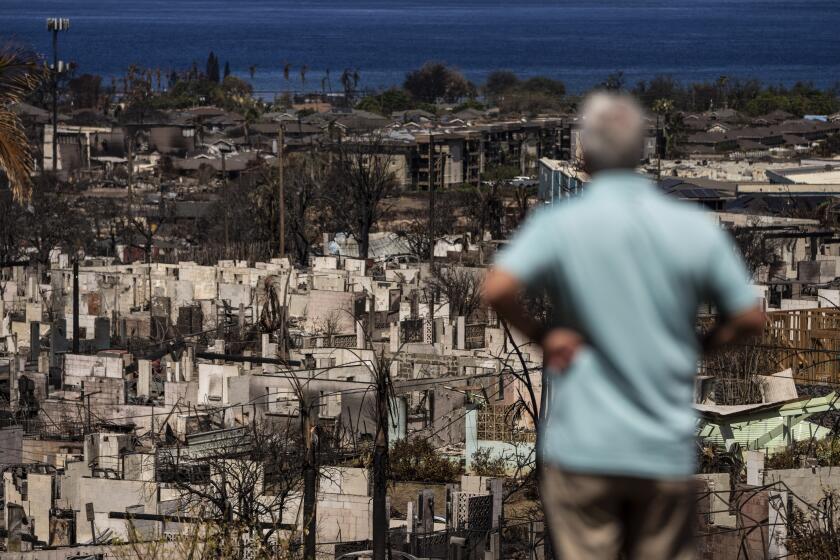Nervous City Looks Over Its Shoulder : Bombings, False Alarms Shatter Life Style in Paris
The French capital hardly resembles a city under siege these days, but the recent rash of terrorist bombings--four in eight days--has spawned an uneasy mood of uncertainty and nervousness and suspicion.
Fewer people take the subways. Those who do watch one another closely. A shopping bag or an Arab complexion attracts suspicion.
With some Parisians avoiding subways, the increased demand for taxicabs has created long lines at cab stands. Everyone in this city of 9 million talks about the bombings. False rumors are picked up and spread. No one boasts of a sure way to deal with the threats.
Guards check shopping bags, pocketbooks and briefcases at the entrances to department stores, banks, movie theaters, public buildings. Shopkeepers on the Champs Elysees, scene of two bombings, complain of a sharp drop in business. Riot policemen patrol the streets with submachine guns.
The problem is compounded by the fact that Parisians use their city’s downtown area, its public places and subway system in a way that is hard for most Americans to grasp.
The center of Paris is an architectural and sociological and commercial delight, and it attracts Parisians who come by convenient public transportation from every other part of the city. Many of the places bombed by the terrorists in the last nine months are frequented by Parisians. To stay away from the city’s public places, or to go and then feel worried and encumbered by bag checks, takes much of the joie de vivre out of Paris.
The terrorists, who are demanding the release of three Middle Eastern prisoners convicted or indicted for terrorist acts, have left 14 bombs in the past nine months--four in the past eight days--at such sites as the drivers’ license bureau in police headquarters, the post office at the City Hall, the Galeries Lafayette department store, two suburban trains heading into major Paris subway stations, a bookstore on the Boulevard St. Michel, two shopping arcades on the Champs Elysees and the Eiffel Tower.
By the standards of international terror, the death toll has not been extremely high. Eleven of the bombs have exploded, killing five persons (evidently including one terrorist) and injuring more than 200. But the persistence of the attacks, the feeling that only luck prevented a higher toll in some cases, and the threat of escalation make them frightening to many Parisians.
On the day after a policeman died in a blast as he tried to rush a bomb away from a crowded restaurant on the Champs Elysees, two policemen came upon a woman putting down her suitcases on the same street. They told her she could not leave her bags unattended.
She pleaded with them, saying all she wanted to do was run into the nearby Air France office and change the flight reservation on her ticket.
“Please listen to us, madame,” one of the policeman, polite but nervous, said to her. “You have to understand. One of our comrades was killed last night.”
A travel agent moaned about his bad luck, his train held up for half an hour in the morning while police searched for a bomb in a false alarm. “How would you like to be trapped underground for a half-hour?” he said.
The Galeries Lafayette, the huge department store near the Opera, was less crowded than usual at lunchtime Tuesday, but a security guard at the main door still had a hard time coping with the handbags of women pushing past him.
There was an attempt inside the ornate, 19th-Century store to keep a festive air despite the absence of the usual milling crowds. Pushing a new perfume called “Beautiful,” a piano player perched on an enormous podium under the magnificent stained glass dome of the store played American cocktail music while men and women clerks all in tuxedos sprayed customers with samples of the new perfume.
The routine checking of bags began in Paris only this week, and some of the checking was obviously left to inexperienced hands. A young postal clerk in her early 20s stood in front of a post office on the Champs Elysees and made a perfunctory attempt to check some of those entering. “I’m scared,” she confided to a customer.
Streets continued to reverberate Tuesday with the wailing of sirens as the police checked scores of false alarms, some from pranksters, some from suspicious citizens who had spotted bags lying around in public places. The continual wailing has intensified all the rumors.
Stock Exchange Evacuated
One false alarm led the police to evacuate the Paris stock exchange for an hour. After a search turned up nothing, officials of the exchange announced that it would be closed to the public from now on.
The fear of terrorism led to the cancellation of a private conference of Israeli Jews and Palestinian Arabs in Paris. On top of this, the organizers of the fifth annual festival of the Jewish cinema, while announcing that they would hold their opening as planned on Wednesday, canceled the rest of the festival.
New requirements that foreigners from countries other than the European Communities and Switzerland obtain visas before entering France went into effect Tuesday. The rules, part of the effort to keep would-be terrorists from slipping into the country on fake passports, resulted in waits of up to one hour at Charles de Gaulle and Orly airports and some grumbling from tourists awaiting their visas.
The ruling prompted an appeal from members of the European Free Trade Assn., a counterpart to the European Communities composed of Austria, Finland, Iceland, Norway and Sweden, for an exemption from the visa requirement.
Despite all the anxiety, Paris has known much worse in the past. The present wave of bombing has been less bloody and intense than that of the Secret Army Organization, an extreme right-wing French group that tried to topple the government of President Charles de Gaulle and prevent the independence of Algeria with a series of attacks in 1961 and 1962.
700 Bombings in 18 Months
The Secret Army Organization was responsible for more than 700 bombings in 18 months, including 18 in a single night in Paris. The most murderous attack came outside Paris in June, 1961, when an explosion derailed the Strasbourg-to-Paris train, killing 28 people and injuring more than 100.
But for many Parisians the ferocity of the bombings of 25 years ago is only a distant memory, and the present wave of terror is fearful enough.
The Paris bureau’s editorial assistant, Alice Sedar, contributed to this report.
More to Read
Start your day right
Sign up for Essential California for news, features and recommendations from the L.A. Times and beyond in your inbox six days a week.
You may occasionally receive promotional content from the Los Angeles Times.






